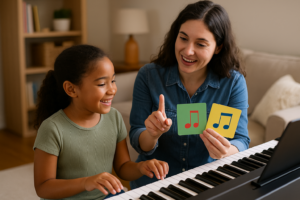As a team of experienced private music teachers who work with mostly beginner students, we often see how music can boost more than just musical ability. In fact, music lessons strengthen math skills in young learners in ways that surprise many parents.
We’ve worked with countless students, and time and again, we see how music helps reinforce key math concepts — like fractions, patterns, and spatial reasoning — without students even realizing they’re doing math.
Rhythm = Fractions in Action
When we teach rhythm, students are constantly dividing beats: quarter notes, eighth notes, whole rests. They learn to visually and physically experience how parts fit into a whole — a concept that’s essential in early math learning. Understanding how four quarter notes fit into one measure of 4/4 time isn’t just music theory — it’s practical fraction work.
Patterns and Counting
Music is built on patterns. From repeated melodic phrases to rhythmic sequences, students develop their pattern recognition skills with every song they play. They’re also practicing counting in structured, rhythmic ways — an essential foundation for early arithmetic.
Spatial Reasoning and Memory
Reading music helps students strengthen spatial awareness — they’re tracking notes across a staff, moving fingers along an instrument, and mapping sound to physical space. All of these tasks require the brain to multitask in a way that’s incredibly similar to solving math problems.
Music and Math Make a Powerful Team
We’ve seen the transformation firsthand: students who struggle with math in school often thrive in music lessons. Over time, that confidence carries over. Music becomes a pathway to better problem solving, sharper focus, and a more positive attitude toward learning. Start lessons today to reap these benefits.
